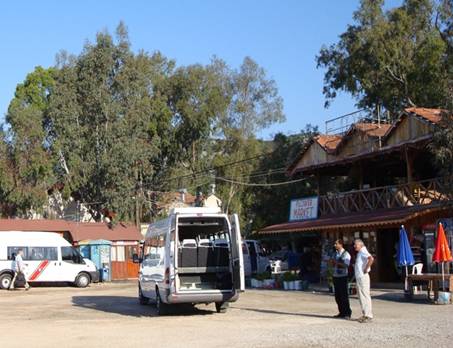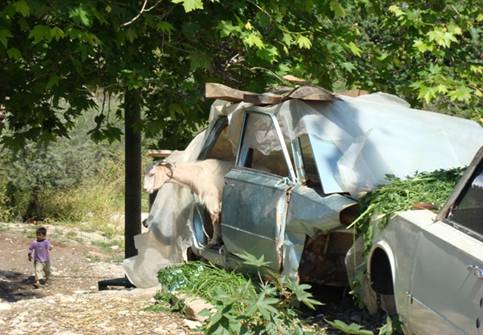In Cod we trust.

|
36:11.5N 29:50.6E Kekova Roads was a real treat. We took the dingy
ashore for a look around on our first morning and followed a section of the
Lycian Way round to the Castle at Kale Koy where, inevitably a small cluster of
shops selling all the usual things cling to the side of the hill. Lynn
had recommended one as the place to find nice fabrics and it was quite a place
with all sorts of beautiful cloth, bedspreads, Turkish bath towels, throws,
woven, embroidered, appliquéd. All lovely. Kadriye, who set up the
shop was a delight. Her family made Turkish carpets so no surprise she
has an eye for lovely things. She has travelled in India, worked on
superyachts, studied in UK and worked as a nanny for a family in Witney,
roughly four miles from where we live. We bought Hamam (Turkish Bath)
towels and will be back for more we suspect, they are a bit like a bath sized
soft T towel so probably very good when the weather is really hot. And,
as ever being practical, will take up a lot less room in a load of washing! This is the time of year for collecting sage and oregano and
the scent wafts across whenever you pass someone carrying a large bundle.
They dry it and use it for the rest of the year. A young girl gave me a
couple of stalks when I was watching what she was doing and I collected some
more from the side of the track which is now drying on the deck along with an
experiment in sun-dried tomatoes. On Tuesday we caught the 0830 Dolmus into the nearest town
Demre. A rather agricultural place where every third shop sells farm
implements or fertiliser and the town emblem is a giant tomato. There
were poly tunnels for miles in every direction and in every nook and cranny and
the produce looked tremendous. Tomato’s, of course, but peppers,
aubergines, lettuce, courgettes and more in abundance. We were not there
for the veg however but to visit the ruins at Myra and St Nicholas’s
Basilica. First to Myra where we arrived before opening time.
One of the cafe owners helpfully suggested we have a drink and we asked for
Turkish tea thinking that would be easy for them. We were then
entertained by his having a long argument with his wife, I think, over who was
going to go and get the tea because she was busy cleaning the fridge and he
wasn’t doing anything. Arguments sound very dramatic in Turkish,
especially with the very expressive body language that goes along with
it. The ampitheatre is pretty much intact and the hills behind
are covered in elaborate tombs. Apparently the rest of the town is still
there but buried and there is no chance it will be excavated because every
spare inch of the area is used for the veg. There is only one Dolmus in each direction each day so we
couldn’t get back until 6pm which meant plenty of time to explore.
We set off to try to get to the ruined acropolis at the top of the hill and
followed our noses along the road and onto some tracks through straggly
houses. It was very like Nepal with goats and chickens and ladies
carrying large bundles of sticks on their backs. Everyone was very
friendly and kept pointing us in the right direction until we made it to the
top. Then on to the Basilica. St Nicholas was Bishop of
Demre and an all round good egg with various stories about him dropping presents
down chimneys to the poor. The original Father Christmas and much is made
of the connection. Very popular indeed with the Russians and the
surrounding shops are full of Russian orthodox icons and very different
souvenirs to those you usually see. While there we learnt that St
Nicholas is also the Patron Saint of seafarers. First we had heard of it
but we will be sure in future to wish fellow sailors a safe voyage with the
words ‘May St Nicholas hold your tiller’ and pay attention to his
association with the Cod of the Sea. When not otherwise occupied as Father Christmas or the
Patron Saint of Seafarers St Nicholas found time to be the Patron Saint of
pawnbrokers. A slightly odd pairing until you think of the cost of sailing in
which case the pawnbroker connection makes a lot more sense. We spent three nights in Kekova Roads and will be back for
more. A great place to bring our visitors.
Mike and the ‘dolmus’ driver waiting to see how
many of the distant group of backpackers are planning on getting on the
bus. They all were, but then ‘dolmus’ does mean
‘stuffed’ in Turkish.
Drying herbs and tomato’s; growing basil –
if you look carefully you can see that the chickens are roosting under the
liferaft. The goats were having a nap in the starboard cabin when the
picture was taken. The sundried toms were a real success so we will be
doing that again.
|






